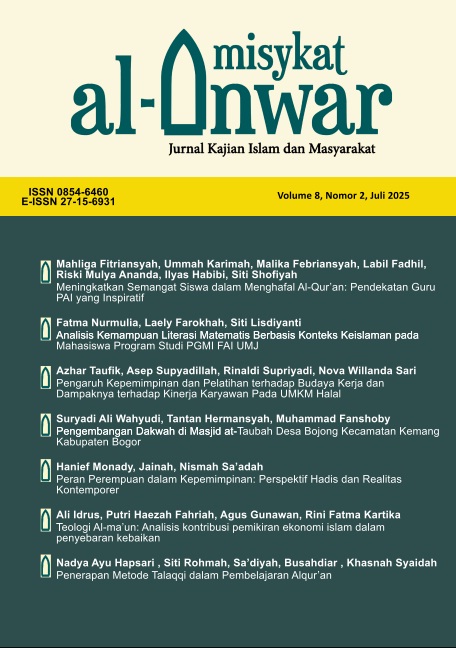Analysis of Islamic Law and Ethics on the Use of Deepfake Technology by Teenagers with Legal and Moral Implications
Main Article Content
Abstract
Article Details

This work is licensed under a Creative Commons Attribution-NonCommercial-ShareAlike 4.0 International License.
All manuscripts published in the Misykat al-Anwar Journal of Islamic Studies and Society are entirely the property of the author, as for the entry and unpublished script of the journal, the copyright is wholly the property of the author.
All manuscripts published in the Misykat al-Anwar Journal of Islamic Studies and Society are open to the public by following the provisions of the CC-BY-NC-SA (Attribution Non Commercial Share Alike) platform where everyone is allowed and permitted to adapt, the results of the study with the provision should provide citation credit to the author (citation) not for commercial purposes, and one must make a similar provision to the results of his research.
---
Semua naskah yang diterbitkan dalam Misykat al-Anwar Jurnal Kajian Islam dan Masyarakat sepenuhnya menjadi hak milik penulis, adapun naskah yang masuk dan belum diterbitkan oleh jurnal, hak cipta sepenuhnya milik penulis.
Semua naskah yang diterbitkan dalam Misykat al-Anwar Jurnal Kajian Islam dan Masyarakat terbuka untuk umum (open access) dengan mengikuti ketentuan platform CC-BY-NC-SA (Attribution Non Commercial Share Alike) semua orang diperbolehkan untuk menyadur, merujuk dan mengadaptasi tulisan/hasil penelitian dengan ketentuan harus memberikan kredit rujukan kepada penulis (citation) bukan untuk kepentingan komersial, dan seseorang harus melakukan ketentuan yang serupa terhadap hasil penelitiannya.
